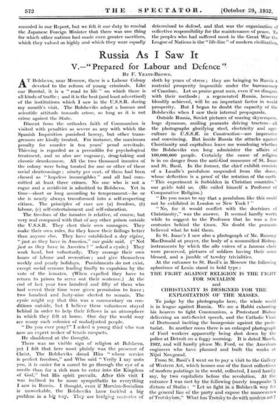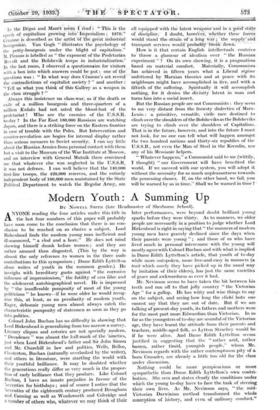Russia As I Saw It V.-" Prepared for Labour and
Defence "- BY F. YEATS-BiOWN, AT Bolshevo, near Moscow, there is a Labour Colony -devoted to the reform of young criminals. Like our Borstal, it is a " road to life " on which there is all kinds of traffic ; and it is the best (and least advertised) of the institutions which I saw in the U.S.S.R. during my month's visit. The Bolsheviks adopt a human and scientific attitude towards crime, so long as it is not crime against the State.
Dissent from the orthodox faith of Communism is visited with penalties as severe as any with which the Spanish Inquisition punished heresy, but other trans- gressors are kindly treated. For instance, the maximum penalty for murder is ten years' penal servitude. Thieving is regarded as a peccadillo for psychological treatment, and so also are vagrancy, drug-taking and chronic drunkenness. All the two thousand inmates of the colony were being treated for one or other of these social shortcomings : ninety per cent, of them had been classed as " hopeless incorrigibles " and all had com-_ mitted at least three crimes. No one who is not a rogue and a recidivist is admitted to Bolshevo. Yet in time—short or long according to temperament—he or she is nearly always transformed into a self-reipecting citizen. The principles of cure are (a) freedom, (b) labour, (c) self-entertainment and self-education.
The freedom of the inmates is relative, of course, but very real compared with that of any other prison outside the U.S.S.R. They elect their own manageis. They Make their own rules, for they know their failings better than anyone else. They have established a dry regime, " just as they have in America," our guide said. (" Not just as they have in America ? " asked a cynic.) They work hard, but voluntarily. They arrange their own hours of • labour and recreation ; and give themselVes weekly and yearly holidays. Punishments do not exist, except social censure leading filially to expulsion by the vote of the inmates. "(When expelled they have to return to prison to serve out their sentence.) At the- end of last year two hundred and fifty of them who had served their time were given pernaission to leave ; two hundred and forty-nine elected to remain. The cynic might say that this was 'a commentary on con- ditions outside, but I believe these volunteerS stayed behind in order to help their fellows in an atmosphere in which' they felt at home. One day the world may sec many such colonies' of maladjusted people.
" Do you ever pray?" I asked a young thief who was now an expert maker of tennis racquets.
He shuddered at the thought. • There was no visible sign of religion at Bolshevo, yet I felt that here most plainly was the presence of Christ. The. Bolsheviks dread Him " whose service is perfect freedom," and Who said " Verily I say unto.. you, it is easier for a camel to go through the eye of a needle than for a rich man to enter. into the Kingdom of God," but His spirit prevailS. After this visit I was inclined to be more sYmpathetic to everything T saw in Russia. I thought, even if Marxian-Socialism is umiorkable, the Bolsheviks have tackled a big problem in a big Way. They are bridging centuries Of sloth by years of stress ; they are bringing. to Russia:a material prosperity impossible under the bureaucracy of Czardom. Let us praise great men, even if we disagree with their methods ; a regenerated' Russia, however bloodily achieved, will be an important factor in world prosperity. But I began to doubt the capacity of the Bolsheviks when I saw their internal propaganda.
Outside Russia, Soviet pictures of soaring skyscrapers, huge dynamos, smiling peasants driving tractors—all the photographs glorifying steel, electricity and agri- culture in U.S.S.R. in CanstructioU—are impressive and convincing. But inside Russia the attacks against Christianity and capitalism leave me wondering whether the Bolsheviks can long administer the affairs of 160,000,000 people. Certainly the cause of religion is in no danger from the anti-God museums of St. Isaac and St. Basil. In the former, the chief exhibit consists of., a Lasalle's pendulum suspended from the dome, whose deflection is a proof of the rotation of the earth.: " This experiment is forbidden in Christian countries," our guide told us. (He called himself a Professor of Comparative Religion.) " Do you mean to say that a pendulum like this could not he exhibited in London or New York ? "
" No, for it would conflict with the doctrines of Christianity," was the answer. It seemed hardly worth while to suggest to the Professor that he was a few centuries behind the times. No doubt the peasants believed what he told them.
In St. Tsaac's I saw also a photograph of Mr. Ramsay MacDonald at prayer, the body of a mummified Bishop, instruments by which the alto voices of a famous choir were preserved, pictures of soldiers having their arms blessed, and a jumble of tawdry trivialities.
At the entrance to St. Basil's in Moscow the following aphorisms of Lenin stand in bold type : THE FIGHT AGAINST RELIGION IS THE FIGHT FOR SOCIALISM and CHRISTIANITY IS DESIGNED FOR THE EXPLOITATION OF THE MASSES.
To judge by the photographs here, the whole world. is in league against Russia.. We see a Rabbi exhorting his hearers to fight Communism, a Protestant Bishop delivering an anti-Soviet speech, and the Catholic Vicar of Dortmund inciting the bourgeoisie against the prole- tariat. In another room there is an enlarged Photograph of Ford workera apparently being shot down by the police at Detroit on a foggy morning. It is dated March, 1932, -and will hardly please Mi. Ford, or the American engineers who have planned and built the works at Nijni Novgorod. • • From St. Baail'S I went on to pay. a .visit to the- Gallery of Western Art, which houses one of the finest collections of Modern paintings in the World, collected, I need hardly say, by two capitalists before the revolution, At the entrance I was met by the following (surely inapposite !) dictum of Stalin : " Let us fight in a Beasheyik way for the 'general line-of the party and expose the manoeuvres of TrahicYisM;'! What has Trotsky to cliiwith thOciern ? In 'the Degas and Manet 6in This the. epoch of capitalism groWing 146' IMperialiSm 1870.7 Cezanne is described as 'the artfst of the great indUstrial bOnrgeolsie. Van- Gogh " illustrates the psychology of the petty-bourgeois under the blight of capitalism." m. Picasso is labelled as " the exponeneof the Proletarian Revolt and the Bolshevik tempo in industrialiiation.' In the last room, I observed a Questionnaire for visitors with a box into which answers could be put : one of the questions was : " In what way does Cezanne's art reveal'' the contradictions of capitalist society ? " and another : `.Tell us what you think of this-Gallery as a weapon in the class 'struggle ? " • • ' Always this insistence on class-war, as if the death or exile of a million bourgeois and thre&qUarters of a million Kaiaks had not sated the blood-lust • of the proletariat! Who are the enemies of the U.S.S.R. to-day ? In the Far East 180,000 RussianS are watching Japan, and there is a striking foreenn the Eastern frontier in case of trouble with the Poles. But Intervention and counter-revolution are bogies for internal display rather than' serious menaces to Soviet security. I can say little about the Russian Armies from personal Contact With them but a visit to the MuSeum of the War Institute at Moscow, and an interview with General Mutnik there convinced inc that whatever else was neglected in the U.S.S.R. it was not defende. I can well believe that the 140,000 first-line troops, the 420,000 reserves, and the entirely independent body of 100,000 men maintained by the State Political . Department to watch the Regular Army, are all equipped with the latest iveipastand of discipline.- I doubt, ' hoWeVei; 'Whether these for* would 'stand' the .strain OF' S; lag the Supp13,•:':ibd transport services would 'Ptobablr ' ' • How is it that certain English intellectuals contrive to throw a glamour of idealism over " the Russian experiment " ? On its own showing, it is a pragmatism based on • material comfort. • Materially, Communism has achieved in fifteen years what a Liberal regime unfettered by Marxism theories and at peace with its neighbours might have accomplished in five, and with . a fiftieth of the suffering. Spiritually it will accomplish nothing, for it denies the divinity latent in 'mail and turns him into a social insect.
But the Russian people are not Communists : they seem to me very distant from the frowsty. dialectics of Marx- Lenin : a primitive, versatile, virile race destined to climb over the shoulders of the Bolsheviks as the Bolsheviks are trying to climb over the shoulders. of Capitalism. That is in the future, however, and into the future I must not look, for no one 'can tell what will- happen amongst the two hundred nations and thirty-six republics of the U.S.S.R., not even the Man of Steel in the Kremlin, nor any of his Messianic helpers.
" Whatever 'happens," a Communist said to me (wittily, I thought) " our Government* will hive benefited the world. If we succeed with our system, you will adopt it without the necessity for so much unpleasantness towards • the possessing classes. If, on the other hand, we fail, you will be warned by-us in time." Shall we be warned in time ?













































 Previous page
Previous page